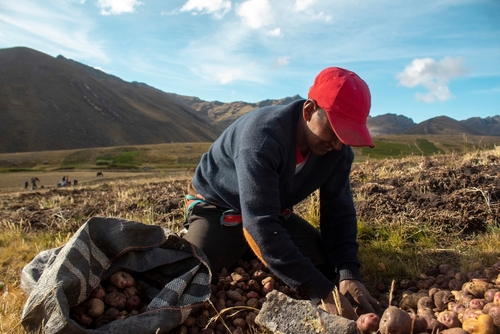New study confirms Irish potato famine pathogen originated in the Andes
- Like
- Digg
- Del
- Tumblr
- VKontakte
- Buffer
- Love This
- Odnoklassniki
- Meneame
- Blogger
- Amazon
- Yahoo Mail
- Gmail
- AOL
- Newsvine
- HackerNews
- Evernote
- MySpace
- Mail.ru
- Viadeo
- Line
- Comments
- Yummly
- SMS
- Viber
- Telegram
- Subscribe
- Skype
- Facebook Messenger
- Kakao
- LiveJournal
- Yammer
- Edgar
- Fintel
- Mix
- Instapaper
- Copy Link
Posted: 27 January 2025 | Ian Westcott | No comments yet
Groundbreaking new research identifies the Andes as the origin of the Irish potato famine pathogen, reshaping efforts to combat crop diseases.


A groundbreaking study by North Carolina State University has confirmed that Phytophthora infestans—the pathogen behind the Irish potato famine—originated in the Andes Mountains of South America, not Mexico as previously debated. “The Andean wild potato species, critical for breeding disease-resistant crops, may vanish due to climate change—threatening global food security.”
The research, published in PLOS One, provides compelling evidence through comprehensive genome sequencing of P. infestans and its close relatives, Phytophthora andina and Phytophthora betacei. The findings confirm that the Andean region served as a hotspot for speciation, where these species evolved together over thousands of years.
“This research settles a long-standing debate about the origin of P. infestans,” said Dr Jean Ristaino, Distinguished Professor of Plant Pathology at NC State. “The Andes are clearly the evolutionary cradle of this devastating pathogen.”
The global threat of P. infestans
Best known for causing the 1840s Irish potato famine, P. infestans continues to threaten agriculture globally, causing late-blight disease in potatoes and tomatoes. While wild Mexican potato species, such as Solanum demissum, have been used for decades to breed resistant crops, this new study highlights significant genetic differences between P. infestans and related Mexican pathogens, such as P. mirabilis and P. ipomoea.
“Our data show that the migrations of P. infestans originated in the Andes and spread northwards, including into Mexico, before wreaking havoc in Europe,” said co-author Allison Coomber. “More recent genetic exchange between South America and Mexico highlights the influence of modern trade and agricultural practices.”
Urgent implications for agriculture
The study also raises concerns about climate change’s impact on Andean wild potato species, which may hold critical resistance genes to combat P. infestans. As droughts intensify at higher altitudes, these wild species face the risk of extinction.
“We must act quickly to study these wild potatoes before we lose a vital resource for breeding disease-resistant crops,” Ristaino added.
A new chapter in plant pathology
The findings not only solve a historical mystery but also provide crucial insights for agricultural science. By understanding the pathogen’s evolutionary history, researchers can better target strategies to prevent its spread and reduce its impact on global food security.
This study underscores the importance of biodiversity and international cooperation in the fight against plant diseases, offering a timely reminder of how interconnected agriculture and environmental changes have become.
For the full details, read the study published in PLOS One.








